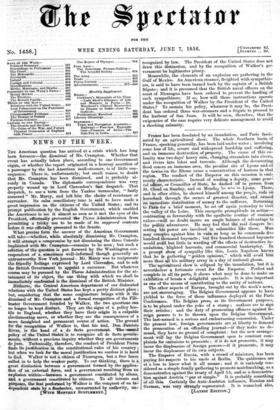NEWS OF THE WEEK - .
THE American question has arrived at a crisis which has long been foreseen—the dismissal of Mr.- Crampt,on. _ Whether that event has actually faken place, according to one Government organ, or whether the report originated in a hearsay assertion of a passenger by the last American mail-steamer, is of 'little con-
sequence. There is, .unfortunately ; but .small reason. to doubt that Mr. CramPton has been dismissed, and is probably al- ready in Canada. The diplomatic correspondence was very properly wound up. in Lord Clarendon's •faiit despatch. That despatch, to . use a term from the Yankee vernacular, "fairly
cornered" Mr. Marcy, and left him the choice of resistance or surrender. Its calm conciliatory tone is said to have made a great impression on the citizens of the 'United States ; and its prompt publication by the English Government, which enabled the Americans to see it almost as soon as it met the eyes of the President, effectually prevented tke Pierce Administration from permitting a tricky use to be made of its supposed contents
before it was officially presented to the Senate. - What precise form the answer of the American Government will take—whether, while absolutely dismissing Mr. Crampton it will attempt a compromise by not dismissing the three Consul; implicated with Mr. Crampton—remains to be seen ; but such a' Solution of the question is put forward by the Washington cor- respondent of a sometimes well-informed, though generally an untrustworthy New York journal : Mr. Marcy was to reciprocate the friendly feelings expressed by Lord ClarendOn, and. to ask the British Government to appoint a successor. But whatever course may be pursued by the Pierce Administration for the at-, tainment of its object, the one thing with which we shall be immediately confronted is the dismissal of the British Minister.
Hitherto, the Central American department of our dislocated relations with the United States has kept a pretty distinct place; but, considering that the same conjuncture brings with it the dismissal of Mr. Crampton and a formal recognition of the Fili- buster Government founded by Walker, the two questions can no longer be kept distinct. They are the signs of a policy hos- tile to England, whether they have their origin in a culpable electioneering move or whether they are the consequences of a more farsighted and permanent course of action. The ground for the recognition of Walker is, that his tool, Don P.atrieio Rivas, is the head of a de facto government. The -inumad policy of the United States is to recognize all de facto govern- ments, without a previous inquiry whether they are governments de jure. Technically, therefore, the conduct of President Pierce finds its justification in the constitutional rules of his country ; but when we look for the moral justification we confess it is hard to find. Walker is not a citizen of Nicaragua, but a free lance called in to help the weaker party. To our thinking, there is a great distinction between a government formed by the applica- tion of an external force, and a government resulting from an explosion within—between a government constituted by aliens, and a government constituted by citizens. To all intents and purposes, the feat performed by Walker is the conquest of an in- gependent state by a freebooter, unwarranted by authority,
recognized by law. The President of the United States does not draw this distinction, and by the recognition of Walker's go- vernment he legitimates piracy.
Meanwhile, the elements of an explosion are gathering in the Gulf of Mexico. An American steamer, freighted with sympathiz- ers, is said to have been turned back by the captain of a British frigate ; and it is presumed that the British naval officers on the coast of Nicaragua have been ordered to prevent the landing of such sympathizers. If so, how will those instructions operate under the reeognition of Walker by the President of the United States ? To sustain his policy, whatever it may be, the Presi- dent has ordered three war-steamers and a frigate to proceed to the harbour of Ban Juan. It will be seen, therefore, that the exigencies of the ease require very delicate management to avoid a shocking calamity.


































